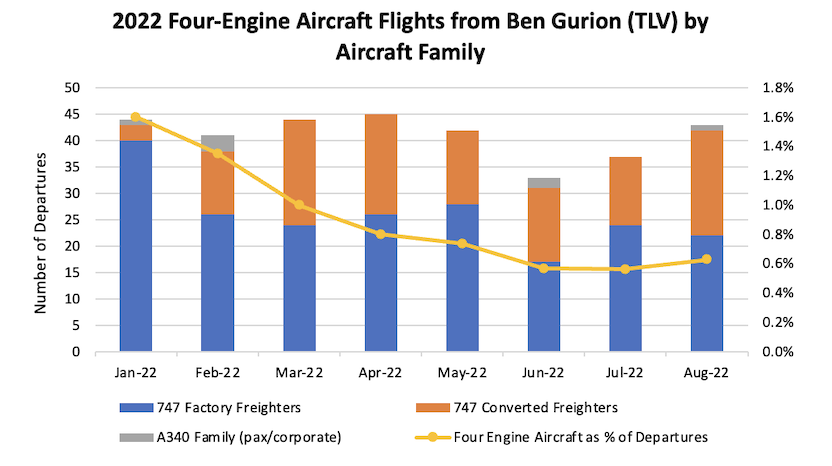IBA analysis: Israeli four-engine ban set to hit converted 747 freighters and boost widebody twin freighter demand
Sep 06, 2022IBA, the leading aviation market intelligence and consulting company, has today revealed a range of insights following Israel’s decision to ban Boeing 747s and other four-engine aircraft in its airspace amid environmental concerns.
Following the widespread demise of the passenger-carrying Boeing 747 following COVID-19, IBA reports that the largest impact of the ban is likely to be on the converted 747 freighter aircraft operated by Israeli flag carrier El Al Israel Airlines (EI AI). Although the ban is mandated to come into effect from March 2023, it is believed that operators may be discouraged from operating such aircraft even sooner.
Mike Yeomans, Director – Valuations and Consulting at IBA, comments: “According to IBA Insight, around 98% of four-engined aircraft departures from Tel Aviv this year have been freighters. Four-engine passenger aircraft numbers are dwindling, and few still operate from Tel Aviv following the withdrawal of El Al’s Boeing passenger 747 fleet from service in 2019.
“According to early reports, there are likely to be some exemptions under a licence agreement. IBA predicts that such exemptions will be applied to Boeing 747 factory freighters, as there is no viable no-loading alternative aircraft for oversized air freight.”
IBA believes that the ban will most-likely affect the converted Boeing 747 fleet. This in turn will likely drive demand for the new generation of converted twin-aisle widebodies, including the Boeing 777-300ERSF, which is being developed by Israel Aerospace Industries (IAI) and AerCap. According to IAI, the 777-300ERSF will offer 15% more volume than the 747-400BCF, and 21% lower fuel burn compared with the 747-400F. If more countries and airports adopt similar stances on four-engine aircraft, the 777-300ERSF and its contemporaries should benefit.
The Airbus A350F and the Boeing 777-8 Freighter are expected to enter service in 2025 and 2027 respectively, with the former firmly targeting the replacement market for ageing Boeing 747 freighters.

Sustainability goals and the drive for net-zero emissions has been a key factor in the demise of many four-engine aircraft. The most prolific four-engine aircraft in global passenger operations today is the Airbus A380. This type does not operate into Tel Aviv at present, and there are currently only 122 active aircraft worldwide. Despite this, IBA noted a recent resurgence in A380 utilisation in their aviation Carbon Index, indicating a year-on-year increase of 177% in July 2022.
Carbon emissions data from IBA NetZero reveals that four-engine aircraft represented only 0.8% of departures from Tel Aviv so far in 2022 and have accounted for 2.2% of total CO2 emissions on departing routes.
Similar Stories

Inauguration of the Fly’in technology center: Daher paves the way for the future of decarbonized aviation
View ArticleHorizon Aircraft signs Letter of Intent with Discovery Air Chile Ltda., expanding global presence of Cavorite X7 Hybrid eVTOLs
New Horizon Aircraft Ltd. (NASDAQ: HOVR), doing business as Horizon Aircraft (“Horizon Aircraft” or the “Company”), a leading hybrid electric Vertical Take-Off and Landing (“eVTOL”) aircraft developer, announced today it…
View Article
WorldACD Weekly Air Cargo Trends (week 1) - 2025
View Article
Lufthansa Cargo exhibiting at Fruit Logistica 2025
View Article
A flying start to 2025 but after 14 months of double-digit demand growth, air cargo stakeholders remain cautious
View ArticlePharma.Aero expands global network with six key new members
CEVA Logistics, Skandi Network, SCL Cold Chain, Shipex NV, Pharming Group, and ARTBIO join the life sciences logistics collaborative platform
View ArticleGet the most up-to-date trending news!
SubscribeIndustry updates and weekly newsletter direct to your inbox!





